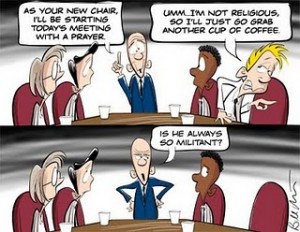 I’m sure if you’re at all active in the atheist community, you’re somewhat familiar with the labels that have been assigned to us over the years. There’s “angry” atheists, “militant” atheists, “overbearing” atheists, and on and on and on. In fact, that seems to be a pretty popular tool of the anti-atheists out there – creating new buzz words that essentially exist to describe atheists as offensively loud, upset to an unwarranted degree, and unacceptably critical of religion. The latest of these labels is (drumroll) – affirmative atheists! Which is evidently closely related to another made up kind of atheism now coined “protest atheism”.
I’m sure if you’re at all active in the atheist community, you’re somewhat familiar with the labels that have been assigned to us over the years. There’s “angry” atheists, “militant” atheists, “overbearing” atheists, and on and on and on. In fact, that seems to be a pretty popular tool of the anti-atheists out there – creating new buzz words that essentially exist to describe atheists as offensively loud, upset to an unwarranted degree, and unacceptably critical of religion. The latest of these labels is (drumroll) – affirmative atheists! Which is evidently closely related to another made up kind of atheism now coined “protest atheism”.
Boo. Hiss.
So, what is protest atheism?
Protest atheism is the belief that there is no God combined with the refusal to recognize or submit to or honor or worship God should it turn out that God does, in fact, exist.
The analogy the author uses to explain this type of atheism he just made up is this –
Consider the following analogy. A man comes back to his home town in Kansas and discovers that it has been wiped out. His first thought is that the town was destroyed by a tornado. But the man also concludes that if there was some intelligence behind the destruction of his town — e.g. an assault by Al Qaeda– then he will rebel against and hate those people who destroyed his town. But for now he believes the culprit was an undirected tornado.
That is like the protest atheist’s position on God. They don’t believe God exists but if he does exist they will refuse to worship him and will hate him.
 Ignoring that in his own analogy, the author has likened his own God to Al Qaeda, the example he uses to show that these types of atheists actually do exist is…a character from a book.
Ignoring that in his own analogy, the author has likened his own God to Al Qaeda, the example he uses to show that these types of atheists actually do exist is…a character from a book.
Yup. His example of this type of atheism is drawn from a story. But you know, when a person is willing to base their life around mythology, I suppose one can’t be too surprised when he decides a fictitious character is a solid example of real world phenomena.
This evidently goes hand in hand with yet new type of atheist, the affirmative atheist. What the heck is that you ask?
This is the view that there is no God combined with a positive attitude toward that fact, a happiness or relief, that there is no God.
The author continues to explain this type of atheist by likening him or her to a child who is afraid of the boogeyman.
To illustrate, imagine a child who thinks there may be a bogeyman in his closet. When his dad investigates with a flashlight and reveals there is nothing in the closet but clothing, a baseball mit, and a bucket of toys, the child is relieved. It is not simply that he now believes no bogeyman exists. It is also that he doesn’t want there to be a bogeyman. That’s like Hitchens. It isn’t just that there is no God. It is that he is happy that (so he believes) there is no God.
And this thought continues to the ridiculous conclusion that the Christian God (or in this example, the boogeyman – a comparison I don’t think the author quite thought through but I wholeheartedly support) is not being rejected by atheists because of the lack of evidence that it exists, but rather it is rejected because we (or whoever might be considered an affirmative atheist) just don’t want it to exist.
It’s the old “you’re just as irrational as I am, therefore we are both at least on equal footing in our belief and non-belief.”
All of this is ridiculous of course, and at the most, good for a laugh. This is an example of how some religious people will bend and stretch reality to suit their own purpose, then have the gall to present that warped reality as if it’s a perspective based on facts and not on their own opinions.
I myself have said that if the Christian God was real, that I wouldn’t worship it. That isn’t in any way an admission that I believe it might be real or that I will not worship a god even if it’s proven to exist or that I am ruled by my desire for a god not to exist more than I am guided by evidence – that’s my position based on what I know about the Christian God. That guy is a dick, and being a woman, why the hell would I EVER worship it? There’s no love for women who want the same rights and freedoms and men in the bible, so I would have to be somewhat self-hating to happily worship the Christian God, even if there was evidence that it existed. And again, that’s a huge “if”.
The fact is, that conversation almost always occurs in response to a “but what if God IS real?” type of question. In order for me to say that I would willingly worship the Christian God, the what-if question would need to be a little more in depth, something like – “What if God IS real, and it says the bible was a load of bull, and that everyone is loved equally and should have the same rights and the same ability to succeed and exist in society as everyone else, and said that there was no Hell and that people of other religions certainly wouldn’t be tortured for eternity for following the religion of their parents (which most people – including Christians – tend to do) – then would you worship it?” And even then I think my response would be – why does it need me to worship it if it seems like such a highly developed and loving entity? Isn’t the demand for worship kind of petty and indicative of a being who is suspect to begin with?
 Regardless, it’s a response to a what-if question, not a response to reality. Judging a person by their response to a what-if makes no sense, it’d be like judging someone for being potentially dangerous because they were asked “what if you could kill someone and wouldn’t cause anyone in the world any emotional or physical pain, including the person you killed, and no one would ever know you did it?” and they responded ‘Maybe I would’. That doesn’t mean that killing someone doesn’t cause immense amounts of pain, that doesn’t mean that the person secretly wants to kill anyone, it’s just a response to a question framed in a way that exists outside of reality.
Regardless, it’s a response to a what-if question, not a response to reality. Judging a person by their response to a what-if makes no sense, it’d be like judging someone for being potentially dangerous because they were asked “what if you could kill someone and wouldn’t cause anyone in the world any emotional or physical pain, including the person you killed, and no one would ever know you did it?” and they responded ‘Maybe I would’. That doesn’t mean that killing someone doesn’t cause immense amounts of pain, that doesn’t mean that the person secretly wants to kill anyone, it’s just a response to a question framed in a way that exists outside of reality.